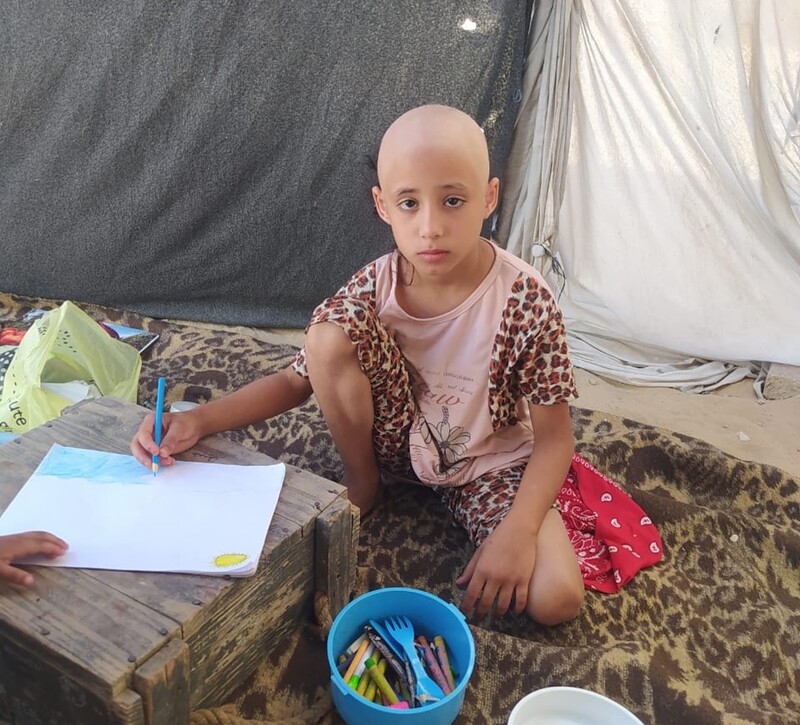The Electronic Intifada 27 September 2024

Sama al-Tabil drawing in the tent where her family is seeking shelter in Khan Younis in southern Gaza. (Photo courtesy of the family)
Hussein and Olfat al-Tabil and their four children — Rose, 9; Sama, 8; Muhammad, 5; and Saif, 3 – have already been displaced five times since last October.
They are struggling to keep their children safe and provide for them during Israel’s genocide in Gaza.
Originally from the Jabaliya camp in northern Gaza, the family was first displaced to al-Bureij camp in central Gaza, Hussein, 33, told The Electronic Intifada.
Then they were forced further south to Khan Younis, then Rafah.
“After the land invasion of Rafah, we were forced to return to Khan Younis and have been displaced several times within Khan Younis since.”
Hussein, a law graduate who had been working in construction because of limited opportunities before last October, said like others in Gaza his family has suffered from the relentless bombing and the near total absence of basic necessities, food, water, shelter, electricity and internet.
In addition to those hardships, however, his youngest daughter Sama’s hair has been falling out. There is no obvious reason, and the family believes her hair loss is due to the psychological stress she is experiencing amid the frequent moves to survive.
“I never imagined that the horror my children and all the children in Gaza are enduring could lead to my daughter Sama losing her hair,” Hussein said.
His daughter, he said, is a top student who loves drawing, coloring and creating handmade accessories from beads.
“She takes great care in choosing her clothes and hair accessories … Every day before the war, she would carefully select a hairstyle for the day,” Hussein said.
Traumatic night
No one can be sure, but Hussein dates the start of Sama’s hairloss to one particularly fraught night in Rafah when they woke up to “the sound of shells and the frantic firing from quadcopters.”
“I quickly gathered my children and their mother and rushed to the Indonesian Hospital,” Hussein recalled, referring to the branch of the hospital that had been opened in Rafah.
“Sama kept asking, ‘What’s wrong, Dad? Dad, what’s happening?’”
“I tried to reassure her, but how could I when even I was overwhelmed by the deafening sounds of the shelling? She began to scream, ‘I don’t want to die,’” Hussein remembered.
But a traumatic night only got worse and when the Israeli military bombed the upper floor of the Indonesian field hospital, he and his family “fled to Khan Yunis in desperation.”
Sama’s hair began to fall out three days later “at an alarming rate,” her father said, pointing out that her mental state “deteriorated rapidly from the terror and the hair loss” and that he felt unable to do much to help her.
“I took her to several doctors, but none could diagnose her condition. Some prescribed medications, but they had no effect; in fact, they seemed to make things worse,” Hussein said.
He said he started giving Sama what vitamins and supplements he could find, but was told by one doctor that her treatment “should be psychological, as she does not have any organic disease that could explain the hair loss.”Her treatment might need to focus on her mental health, but how, Hussein wondered, during genocide?
“Every day, my daughter wakes up to the sounds of bombings, displacement, the cries of the wounded, screams and terror. I don’t know how to improve her psychological state under these circumstances,” Hussein said.
Sama said she wanted her “hair to be like it was before.”
“Kids in the street ask me, ‘Do you have cancer?’ So I go back to the tent and cry to my mother, who tries to reassure me that I don’t have cancer,” she told The Electronic Intifada.
To her, living in a tent “is terrifying and incredibly hard.”
“I just want to go back to my home. Or leave Gaza. I want to get treatment,” Sama said.
Aseel Mousa is a journalist based in Gaza.





